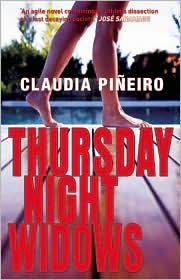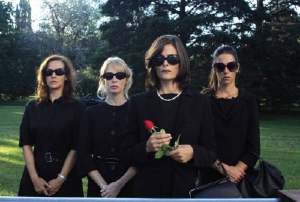Note: This novel was WINNER of the 2005 Clarin Prize for fiction in Argentina.
“Entrance into The Cascade induces a certain magical forgetfulness of all that went before. The past is reduced to last week, last month, last year, ‘when we played the Inter-club Challenge and won it.’ Gradually we forget our lifelong friends, the places we once loved, certain relations, memories, mistakes. It’s as though it were possible in mid-life, to tear the pages out of your diary and begin to write something new.”
Despite th e tacky cover, with its closeup of perfect, cellulite-free legs and the suggestion of other enhanced body parts, this book is no “penny dreadful.” Instead, the cover accurately reflects the values of the beautiful people of Cascade Heights, a gated and walled residential community thirty miles outside Buenos Aires with full-service security–along with a golf course and top-quality tennis. The wealthy residents of The Cascade, as they call the community, have left their old lives behind, and many of them are delighted to have escaped some unpleasant memories. Living in elaborately built houses with spectacular landscaping, the three hundred residents have created a world apart, their children leaving for brief periods each day to attend an equally elite school outside the community, and then returning home, where they can wander the grounds at will, without supervision. The women have few, if any, interests outside the community.
e tacky cover, with its closeup of perfect, cellulite-free legs and the suggestion of other enhanced body parts, this book is no “penny dreadful.” Instead, the cover accurately reflects the values of the beautiful people of Cascade Heights, a gated and walled residential community thirty miles outside Buenos Aires with full-service security–along with a golf course and top-quality tennis. The wealthy residents of The Cascade, as they call the community, have left their old lives behind, and many of them are delighted to have escaped some unpleasant memories. Living in elaborately built houses with spectacular landscaping, the three hundred residents have created a world apart, their children leaving for brief periods each day to attend an equally elite school outside the community, and then returning home, where they can wander the grounds at will, without supervision. The women have few, if any, interests outside the community.
Argentine author Claudia Pineiro carefully analyzes the behavior of these residents, concentrating, in particular, on four couples who live in the same neighborhood. The men play cards at the same house every Thursday night while the women go to the cinema. The novel begins on Thursday night, September 27, 2001, when the wife of the host returns home and doesn’t hear any noise from the card room or pool. Thinking that her husband and his friends are in the changing room at the pool, she goes to bed. When she awakens later, she discovers that he and two of his friends are dead. The third friend, Ronie Guevara, had gone home from cards early.

Using Virginia Guevara, a real estate agent who lives in the compound, as the primary narrator, the author dissects the lives of these characters in the ten years leading up to this September, 2001 event, skewering their pretenses, their blatant dishonesty, their flouting of the law, and their feeling of entitlement. Recent years have been marked by a severe economic downturn in Argentina. Inflation, which was 1300 percent in 1990, was curbed when Argentina passed the Convertibility Law in 1991, thereby tying their peso to the US dollar, and life was good during much of the decade, as the economy has started to flourish, but with the collapse of the Asian market and its effects on world markets, Argentine businesses feel the pinch, and now, in the 21st century, many young businessmen are in trouble.
With her tongue firmly set in her cheek, the author creates a story filled with dark ironies, through which she reveals all the secrets which the residents are keeping from each other, including their spouses. By making their problems so close to those of any self-protecting, upscale suburban community, regardless of country, she succeeds in creating identification between the outrageous characters and her readers, regardless of their income level. These characters’ lives are just close enough to the norm that they seem in many ways “ordinary,” their behavior, however extreme, common enough that it is easily recognizable for what it is. Their casual dishonesty is a given. Because they are extreme stereotypes, they are laughable.
 By the time the reader discovers how the men have died, that revelation comes as no surprise. And as the burials begin, Virginia Guevara, brings together the many ironies in the novel, commenting on the “immortal intruders” which will also be buried with all the characters and which, unlike the bodies, will never decay–replaced hips and knees, pins for broken bones, new false teeth and dental implants, pacemakers. “I thought of silicone implants, too,” she remarks. “Implants would survive burial, the body’s wastage….I imagine the private cemetery where they bury the women from Cascade Heights sown with silicone globes, orphaned now from the breasts that had owned them, six feet below that immaculate lawn. Bones, mud and silicone. And teeth. And pins.”
By the time the reader discovers how the men have died, that revelation comes as no surprise. And as the burials begin, Virginia Guevara, brings together the many ironies in the novel, commenting on the “immortal intruders” which will also be buried with all the characters and which, unlike the bodies, will never decay–replaced hips and knees, pins for broken bones, new false teeth and dental implants, pacemakers. “I thought of silicone implants, too,” she remarks. “Implants would survive burial, the body’s wastage….I imagine the private cemetery where they bury the women from Cascade Heights sown with silicone globes, orphaned now from the breasts that had owned them, six feet below that immaculate lawn. Bones, mud and silicone. And teeth. And pins.”

Interesting for its picture of the effects of a global economic downturn on one community of wealthy businessmen, it is also an unforgettable picture of the empty lives which these men and their wives are happy to lead–the “causes” they adopt which accomplish nothing, their view of reality which is limited to their own social class, the inability to communicate with anyone because their individual lives are so egocentric. Great fun to read and often darkly humorous, this novel is a clear and uncomplicated social commentary which readers from many parts of the world will find intriguing and thoroughly enjoyable.
ALSO by Claudia Pineiro: ALL YOURS, A CRACK IN THE WALL, BETTY BOO, ELENA KNOWS
Notes: The author’s photo is from http://staticvos1.lavozdelinterior.com.ar
Her bio is on www.mertin-litag.de
This book has been filmed by Marcelo Pineiro, and the trailer is here: www.quietearth.us. (Just scroll down when the link opens.)
The Thursday Night widows from the film may be seen here in this still photo: http://www.quietearth.us
